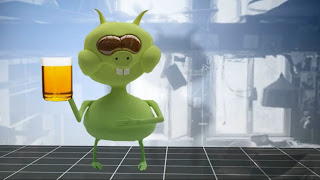Recently, the
Seattle Atheists have launched an ad campaign promoting the idea that
1 in 4 Washingtonians is an atheist. The group has
received some slack over the claim, but they have
defended their numbers by pointing out the main consideration when counting atheists: many atheists do not self-identify as atheists. (I personally know at least five people who are atheists who do not self-identify, two of whom have even explicitly rejected the term as being an appropriate label.) The one area where I do have issue is they themselves say that only 1 in 5 statewide is an atheist; the 1 in 4 concept is for the Seattle area only, which is where the ads appear. So...slightly misleading.
But it's not the slightly misleading statement that I am here to write about. My complaint is with the response to this from
Ask an Atheist, a Seattle-area radio show. The following is part of their response to the ad campaign:
Labeling people as atheists when they intentionally avoid the phrase is a misstep. While the wider discussion we have on atheism here on the show would include many of these people, we believe people reserve the right to label themselves.
I find this statement a bit frustrating in part given the fact that the hosts of this show, even in the same episode in which they presented this statement, recognize that there is a social stigma around declaring non-belief in a deity. This is frustrating because I recognize, as I suspect the hosts of the show do as well, that these stigmas will not go away unless more people who are atheists are open about it.
The other part that I find frustrating is the idea of considering "atheist" to be nothing more than a label in the sense of branding someone as part of a group. This is the type of labeling one will see when stereotyping, which is what I think is the real problem here. People don't want to be part of group A because then people will incorrectly attribute characteristics X, Y, and Z to them. So this frustrates me for two main reasons: (1) By refusing to be labeled, people are avoiding having to address the real problem of stereotyping. It should go without saying that a problem typically does not go away when avoided. (2) Labeling should be seen as descriptive—without the stereotypes. In fact, the
Free Dictionary defines it as "a descriptive term; an epithet." If someone lacks a belief in gods, then I'm going to label them an atheist because that is what they are. I'm not going to be afraid, to borrow a phrase
Sam Harris commonly uses, to call a spade a spade! I am a white heterosexual male atheist, as well as a number of other things. Is that labeling myself or just stating the facts? Or both? Would anyone believe me if I said I'm a black homosexual female Christian?
Once upon a time—actually, it is still present today, but is fading away—it wasn't cool to be gay, and I don't mean "happy." Things that are lame or even abnormal were considered to be gay.
According to Urban Dictionary:
[O]ften used to describe something stupid or unfortunate. originating from homophobia. [Q]uite preferable among many teenage males in order to buff up their "masculinity." "Man, these seats are gay. I can't even see what's going on!"
But thanks to homosexuals "coming out of the closet," people know more homosexuals and are realizing they aren't really any different than most heterosexuals. Hopefully the profane use of the word "gay" will soon fall out of use. Either way, that is how you combat a stereotype—you face it head on! That means taking on labels and being true to yourself.
This is something the atheist movement is trying to do. People who are not believes in deities are being encouraged to come out of the atheist closet. Now, I understand that some people cannot be open about their lack of belief. I know one such atheist who is a Muslim apostate. The punishment for that can be death. While I know this person to be an atheist, I am not going about announcing this fact to other people. But for people who have nothing to worry about? Yeah, I'm going to label them.
The one objection I can see with labeling people as atheists is not being able to confidently know that they are indeed atheists, as it is impossible to read minds. It's not as easy as, say, labeling a person like me as white; my skin color clearly gives that one away. It's not even as easy as identifying gender. (As one who is married to an intersex individual, I recognize that gender isn't..."black and white.")
Now I certainly give kudos to the Ask an Atheist crew because they are there to help combat the stereotypes. But then again, they have accepted the label. Where we differ, I think, is that they are trying to present a more welcoming environment in which theists can even feel welcome. I am more of what are called the "firebrand" atheists. I'll give people a metaphorical kick in the ass if I think they need one.


